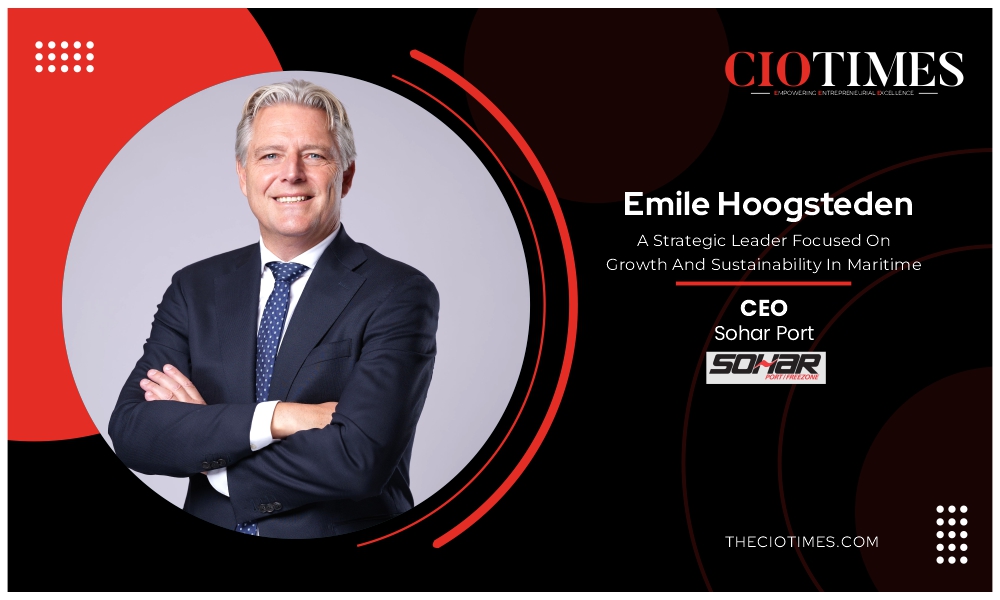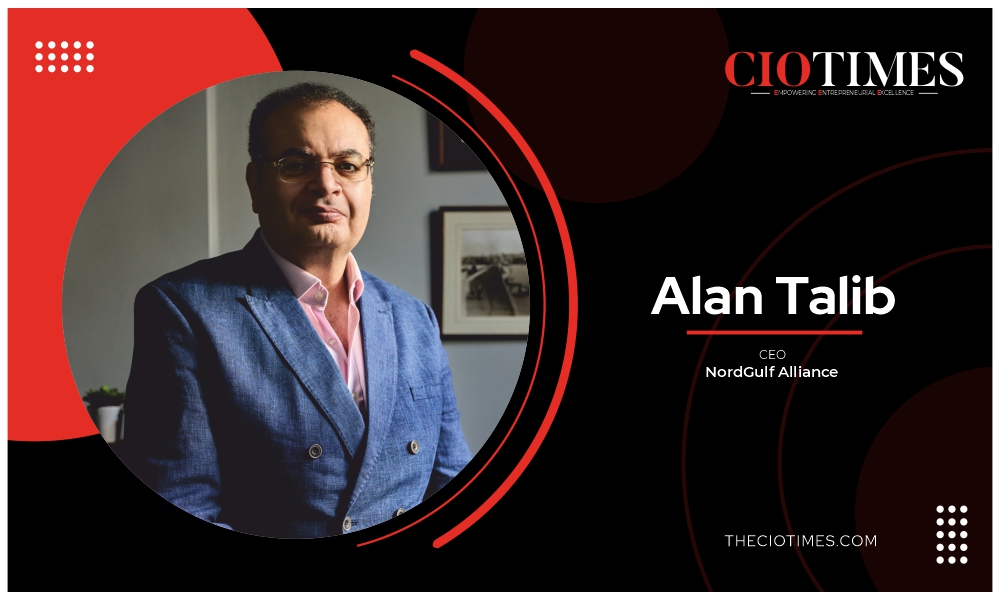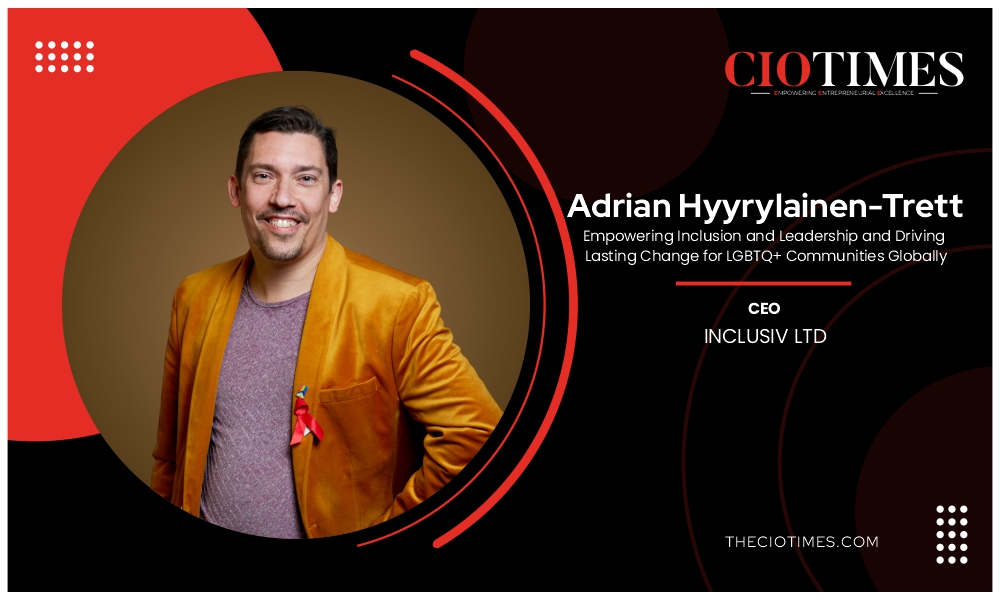Emile Hoogsteden is a seasoned leader in global logistics, commercial shipping, and port management, with over 30 years of experience shaping the future of maritime trade. As the CEO of SOHAR Port, a joint venture between the Port of Rotterdam Authority and Oman’s ASYAD Group, he is driving the port’s expansion, sustainability initiatives, and digital transformation.
Emile has a strong track record in business strategy, economic diversification, and investment growth. His leadership is instrumental in positioning SOHAR Port as a key hub for international trade, aligning with Oman’s Vision 2040 for economic development.
The Road to SOHAR
Over the past three decades, Emile has dedicated his career to the global industry of ports, shipping, and logistics. He started at ECT Rotterdam, at the time a local container terminal operator, where he gained crucial experience in terminal operations and customer engagement. From there, Emile moved to Nedlloyd Lines/P&O Nedlloyd, where he held several strategic leadership roles, including Director of Terminal Development and General Manager Ports and Terminals. In those positions, he was responsible for global terminal strategies and forging international partnerships.
Emile’s experience further deepened during his time at the headquarters of APM Terminals, where he was responsible for terminal projects in Europe. Finally, he joined Port of Rotterdam, where he served as Vice President Commercial. These roles honed his skills in port infrastructure development, commercial cooperation, and global shipping partnerships.
Joining SOHAR Port and Freezone as CEO in 2022 felt like a natural progression. Emile was drawn to SOHAR’s exceptional potential: its prime location at the crossroads of regional trade routes, the huge expansion opportunities, its alignment with Oman’s Vision 2040, and its strong national mandate for sustainable industrial development. This position allows him to bring a wealth of global experience to a local opportunity that truly matters.
A Dynamic Port Poised for Growth
SOHAR Port and Freezone is quickly emerging as one of the Middle East’s most dynamic integrated logistics and industrial hubs. Situated between Muscat and Dubai, it sits at the crossroads of Asia, Europe, Africa, and the GCC, making it a key player in regional trade. SOHAR handles over 38% of Oman’s total trade by value and contributes 2.1% to the national GDP.
Its services include container, dry bulk, breakbulk, and liquid cargo handling, marine services, warehousing, and a thriving Freezone that offers attractive incentives for investors. With the backing of strong shareholders like ASYAD Group and the Port of Rotterdam, SOHAR is a major driver of Oman’s logistics and industrial growth.
As CEO, Emile is focused on taking the port and freezone, as well as the organization, to a higher level, to world-class standards, accelerating the green energy transition, embracing digital innovations, and expanding the investor services.
“We are working hard to expand the port and the freezone, to increase connectivity, both overseas as well as over land, and to build out our strategic partnerships with customers, ensuring that we can meet the growing demands of global trade. My vision is to position SOHAR as the preferred destination for global trade, investment, and innovation,” shares Emile.
Leadership Shaped by Experience
The jobs early in his career have taught Emile what the port, shipping, and logistics business is actually about. He gained inside knowledge of supply chains, the interdependencies, and the vulnerabilities. His experience at the Port of Rotterdam has shaped his leadership by emphasizing the importance of long-term vision and innovation. He has learned that port development is about more than just infrastructure—it’s about creating an environment that fosters growth, sustainability, and adaptability. And he has learned that cooperation, partnership, and communication are of the essence.
At SOHAR, Emile has taken these lessons and implemented them by fostering agility and resilience in a rapidly changing trade environment. For example, he has introduced the region’s first mass flow meter system for bunkering and has piloted AI-driven drones for enhanced operational efficiency. His leadership approach centers around collaboration with all customers, stakeholders, regulators, and local communities, ensuring that they are all aligned toward shared success.
Attracting Global investors to SOHAR
SOHAR’s approach to attracting global investors is based on four core pillars: location, integration, sustainability, and partnership.
SOHAR’s strategic location outside the Strait of Hormuz provides excellent sea connectivity, without substantial deviation from the main sailing routes, making it an ideal hub for trade. Furthermore, the company is building out its connectivity over land. Next to the land bridge directly from SOHAR to Riyadh, as from 2028, they will be directly connected via rail to the UAE, Abu Dhabi, and Jebel Ali.
The port and freezone are fully integrated, under one company, under one management, connected by a bonded corridor. In this way, investors can fully enjoy synergies between the port and the freezone, whereas the corridor facilitates seamless cargo flow, creating a highly efficient supply chain.
SOHAR is also a leader in sustainability. As an entrepreneurial port authority, it is actively involved in decarbonization and energy transition initiatives. Together with its tenants, it has formed the so-called SOHAR Net Zero Alliance, in which they share knowledge, best practices, and work on initiatives like CCUS, solar power projects, and green hydrogen readiness.
This points out a very crucial point: partnerships. Emile, as the leader of SOHAR, believes in close collaboration with the customers. They don’t just sign contracts, they team up and stand next to their tenants and investors to assist in helping their business develop. For they know, if they are successful, SOHAR is successful.
“On top of the four pillars just mentioned, investors benefit from strong government support, a transparent regulatory environment, and integrated services that streamline operations.
And we offer 100% foreign ownership, long-term leases, tax incentives, and proximity to world-class logistics infrastructure. This integrated ecosystem allows businesses to establish themselves and grow quickly and efficiently,” says Emile.
Aligning Operations with Strategic Goals
For Emile, operations and strategic goals should go hand-in-hand, always. SOHAR’s focus on HSSE (Health, Safety, Security, and Environment), operational excellence, infrastructure reliability, and client services is designed to support its own long-term strategic goals as well as the broader national economic ambition.
SOHAR aligns its daily operations with strategic initiatives such as attracting green industry investments, enabling advanced manufacturing, building out its portfolio of marine services, and positioning itself as a world-class bunkering port. Additionally, its energy transition and circular economy programs are prime examples of how operations and strategy work together to drive Oman’s diversification agenda.
Supporting Vision 2040
Sustainability is at the core of SOHAR’s identity. Emile and his team are deeply committed to contributing to Oman’s Vision 2040, which emphasizes a sustainable, diversified economy. Sustainability is a key strategic pillar of their overall strategy. They have developed a program consisting of many initiatives/projects in the fields of efficiency, renewables, CCUS, green hydrogen, and circular economy.
SOHAR’s key sustainability initiatives include Project MARSA LNG, a $1.6 billion, 100% solar-powered LNG bunkering hub, delivering low-carbon LNG as fuel for vessels. Furthermore, they are working on plans for the development of infrastructure to support green fuels like ammonia, methanol, and biofuels.
Emile and his team are also leading the way with the SOHAR Net Zero Alliance, a coalition of SOHAR Port and Freezone and the tenants, working together to improve energy efficiency. Furthermore, SOHAR’s 25 MW solar plant provides clean energy to power operations, and the Qabas project is focused on producing green energy solutions within the Freezone.
“Our circular economy initiatives, such as battery recycling and waste management programs, are designed to promote sustainability and contribute to a more sustainable future for Oman.
Lastly, environmentally friendly waste collection from vessels is one of the Marine Services that we have on offer,” informs Emile.
Digitalization for Enhanced Efficiency
Just like energy transition, digitalization is a foundational pillar of SOHAR’s strategy. By enhancing its digital capabilities, it will increase efficiency, reliability, transparency, customer value, and cost-effectiveness. Ultimately, it will be able to deliver smart services to its customers and to the customers of its customers, increasing predictability and cutting waste out of the supply chain.
For instance, Emile shares that in 2024, they launched Marasi, a real-time port management system that has reduced vessel processing times by 20%. This system is a significant step toward modernizing SOHAR’s operations and improving efficiency.
They are also implementing a Port Community System (PCS) to digitally integrate customs, shipping agents, and tenants, streamlining the entire logistics process and enhancing transparency. In partnership with Omantel, SOHAR is exploring the possibilities of 5G connectivity and automation, which will allow it to implement real-time monitoring and predictive maintenance across its operations.
“Additionally, we are collaborating with Sultan Qaboos University on AI-driven analytics and drone-based asset tracking within the Freezone. These technological advancements help position SOHAR as a destination for tech-driven industries and innovation,” shares Emile.
Trends Shaping Logistics
Emile observes three key trends shaping the future of logistics:
Sustainable fuels, digital transformation, and regionalized supply chains.
SOHAR is adapting to these shifts by investing in green fuel infrastructure like the MARSA LNG project and supporting digital transformation with the implementation of smart systems and automation.
Its location at the junction of Asia, Europe, Africa, and the GCC makes SOHAR an ideal hub for companies seeking reliable, future-ready trade routes. Furthermore, its improved connectivity over land to Saudi Arabia and the UAE gives SOHAR a stronger position as a nodal point in GCC logistics. “We’re aligning our infrastructure and policies with these global shifts to ensure that SOHAR strengthens its competitive position and is well-positioned for the future,” adds Emile.
Envisioning Expansions
SOHAR’s future expansion plans are ambitious and diverse. With the port growing fast and nearing full capacity, Emile is actively discussing further expansion of the port area with the Government.
The Freezone is 4500 hectares. The first 500 hectares are being utilized for 85%. The next phase, another 500 hectares, accommodating sectors such as green energy, food industries, and pharmaceuticals, has already been committed for 50%. Meaning, they have already started planning for the next 500 hectares.
“We’re also investing in infrastructure, including roads, drainage systems, and utilities, to ensure that SOHAR meets world-class development standards. To support the growing logistics sector, we’re expanding warehousing capacity. Additionally, the Hafeet Railway project, which will connect SOHAR to the UAE via the Oman-UAE Rail Network, is a key project that will reduce transit times by 40% and help cut emissions,” concludes Emile.




